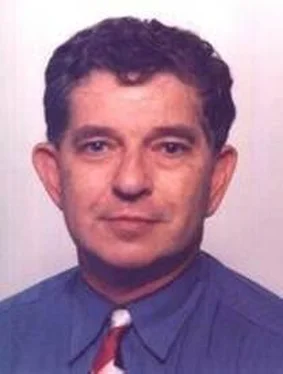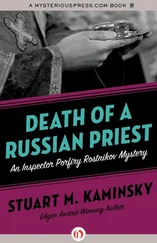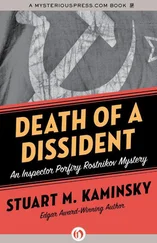"What for?"
"I think Stevie Guista did that to you," she said. "You bled on Lynn Contranos's doorstep. We've got some of that blood."
Carmody went silent.
"You do know Helen Grandfield?" asked Stella.
"Sure," he said.
"She's Lynn Contranos," said Stella.
"Yeah, so?" said Carmody without interest.
"Where is Guista?" she asked.
"Big Stevie? I don't know. Home, out getting drunk or laid. How should I know? It's his birthday. Yesterday. He's probably sleeping off a binge."
"We'll talk some more about Stevie after we match your blood to the blood on the doorstep. Roll up your sleeve."
"What if I say, 'no,' " he said.
"Investigator Messer is very gentle," said Stella. "If you don't want to do it here, we go to our lab, get a court order. Who's on duty at the lab?"
"Janowitz," said Danny evenly.
"You don't want Janowitz," Stella said.
"Janowitz the Jabber," said Danny.
Carmody rolled up his sleeve.
Ned Lyons was the twelfth employee to be led into the supply room and both Danny and Stella knew they had a bingo.
Lyons was lean, well-built, worn face older than his thirty-four years. He was also obviously walking with some pain, which he tried, without any success, to hide.
"You all right?" Stella said as Lyons sat slowly on the wooden chair at the table.
"Stomach flu," he said.
"Should you be working in a bakery with stomach flu?" she asked.
"You're right," said Lyons. "Maybe I'll tell the boss I'm sick."
"Lift your shirt please," said Stella.
Lyons looked around, sighed and lifted his shirt. The bruise on his solar plexus was about the size of a pie plate. It was already turning purple, yellow, red, and blue.
"So what does that tell you?" asked Lyons.
"What did Mr. Lyons have for dinner last night?" Stella asked Danny, who, looking at Lyons, answered, "Pepperoni, sausage, and a lot of pasta," said Danny. "Mr. Lyons likes his sauce spicy."
"How do you know what I-?" Lyons began.
"Open your mouth, Mr. Lyons," Stella ordered.
A now-confused Ned Lyons opened his mouth and Stella leaned forward to look.
When she sat back, Stella said, "Got some good news for you. We found your missing tooth."
* * *
In Louisa Cormier's third book, the killer, an outwardly mild-mannered office manager, had entered a locker in his third victim's basement by using a fourteen-inch long two-and-three-quarter-pound steel-handled bolt cutter.
Louisa had described what it felt and sounded like to cut the lock and hear it thud to the concrete floor. Louisa knew how to use a bolt cutter. The lock on the box at Drietch's firing range had been cut with a bolt cutter. An examination of the lock had made that clear. On the morning of the murder, according to doorman McGee, Louisa had gone out on her usual morning walk carrying a large Barnes and Noble cloth bag, easily large enough to conceal a bolt cutter like the one the author had described in her book.
There was no bolt cutter in the collection of objects in Louisa Cormier's memento case in her library.
No bolt cutter, no.22 caliber weapon, after thirty-two minutes of looking. What Mac did find in the bottom drawer of Louisa Cormier's desk below her computer was a bound manuscript. He placed it on the desk as Louisa Cormier protested.
"That's the draft for one of my earlier books, when I was still using a typewriter. It was never published. I've been meaning to return to it, get it in publishable condition. I'd rather you not…"
Louisa looked at her lawyer, Lindsey Terry, who had arrived a few minutes ago. He held up his palm indicating that his client should hold her protest.
Mac placed the manuscript on the desk, opened its thick green cover, and looked down at the top page.
"Now if you would just put it back," she said. "It has nothing to do with bolt cutters or guns."
Mac flipped the manuscript open to approximately the middle of the book and looked down at the two round holes that ran through the pages.
Mac pointed to the pages before him.
"Nothing sinister," Louisa said. "I shot the book."
Mac tilted his head to one side like a bird examining a piece of something curious that might or might not be edible.
"When I finished it," she said. "I hated it. I lived in Sidestock, Pennsylvania, at the time, working for the local newspaper, free-lancing to supplement my less than considerable wages. I read the book, thought it was a complete bomb, a waste of a year of my life. So I took it outside to the woods behind the house and shot it. I thought my potential life as a writer was over before it really got started. Pure impulse."
"But you didn't throw it away," said Mac.
"No, I did not. I didn't have to. I had gotten rid of my despair. I couldn't bring myself to get rid of the manuscript. I'm glad I didn't. The manuscript is a reminder of the fact that the muses can be fickle. And now, I actually think someday I'll be able to salvage it."
"Do you mind if we take this?" said Mac, turning to the last page of the manuscript. "We'll return it."
Louisa again looked at her lawyer, Lindsey Terry, who had stood silently at her side and said nothing. Terry was nearly ancient, had retired more than a decade earlier but had come back after concluding that he no longer had the passion he had once had for raising exotic fish. Ancient or not, Lindsey Terry was formidable. He was smart and knew how to play the age card. Mac was also sure that if charges were brought against Louisa Cormier, Lindsey Terry would step aside for another lawyer, someone with a much higher profile.
"Does that manuscript have any bearing on the crime for which you obtained a warrant to search?" the lawyer asked.
"Yes sir," said Mac. "I think it does."
"I don't want him reading it," said Louisa.
"Will it be necessary for you or anyone else to read Miss Cormier's manuscript?" the lawyer asked.
"I've become a fan over the last two days," said Mac, looking down at the open page.
"Can't you…?" Louisa began, looking at the bald, freckle-headed, and clean-shaven old man at her side.
"I cannot," said Terry. "I can but warn Detective Taylor that he is engaged in a search which may well be tainted by his exceeding its conditions."
"I understand," said Mac rising.
Aiden entered the room. Before Cormier or her lawyer spotted her, Aiden gave a nod to Mac to indicate that she had found nothing.
"The name of your new novel?" asked Mac.
"The Second Chance," she said.
Aiden moved to the chair Mac had vacated and turned on the computer.
"What is she doing?" asked Louisa.
"Finding the program with your new novel," said Mac.
Aiden's fingers moved quickly from keyboard to mouse and found herself looking at the desktop page. At the right side of the page was a file titled The Second Chance. She clicked on it and scrolled to the bottom of the document.
"Page three hundred and six," Aiden said.
"I'm almost finished," said Louisa.
Aiden went to the hard-drive icon, clicked, opened it, and found files for Louisa Cormier's novels. She looked at Mac and shook her head.
"We're finished," said Mac, taking off his gloves and putting them in his pocket. The manuscript was under his arm, his kit in the other.
When they left the apartment, Mac looked back at Louisa Cormier and decided from what he saw that the famous author no longer thought it would be interesting to be a murder suspect.
"What's the manuscript?" Aiden asked as the elevator descended.
Mac handed it to her. Aiden opened it and looked down at the holes.
"Last page," Mac said.
Aiden flipped to the final page. By the time the elevator stopped at the lobby she had skimmed it enough to know that the words she had been looking at were exactly the same words they had found on the typewriter ribbon of Charles Lutnikov.
Читать дальше












